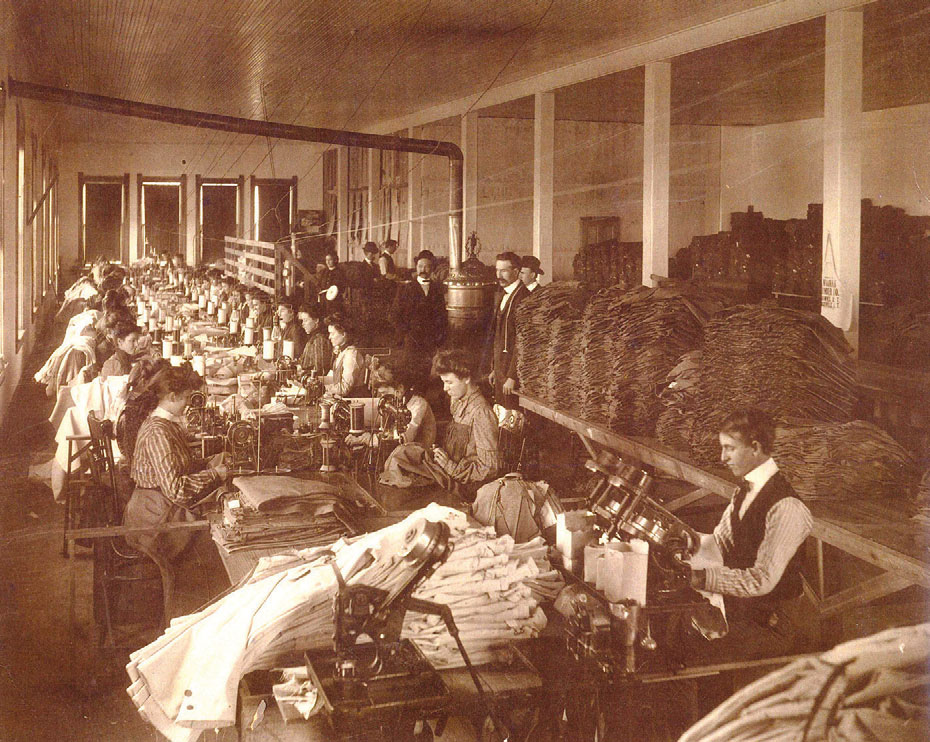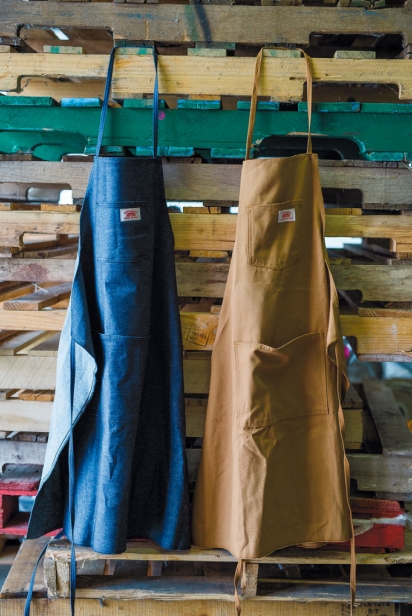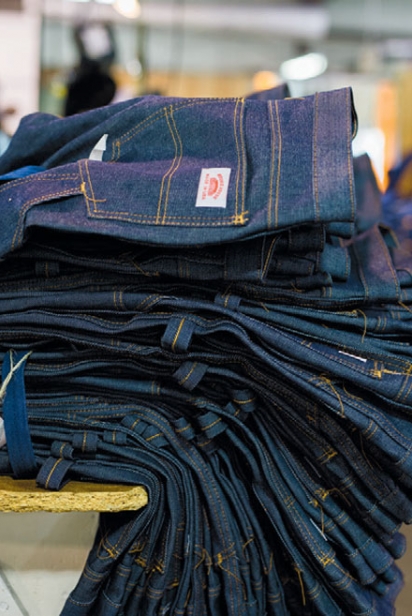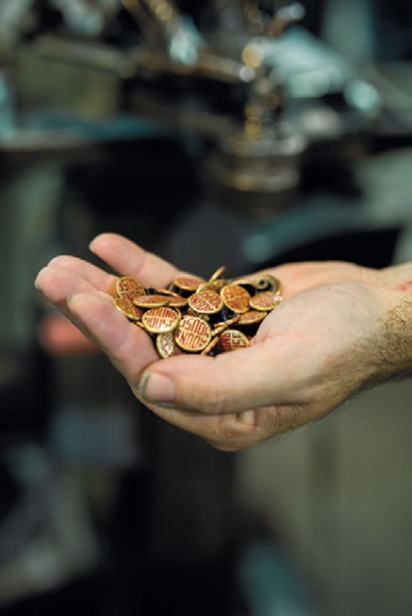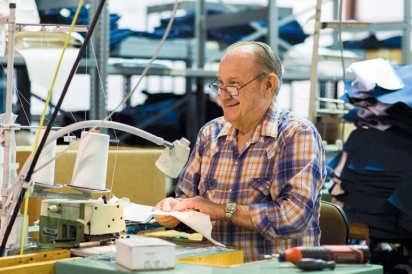Round House
The Right Track: Company Famous for Outfitting Railcar Workers has Fans in Culinary World
David Antosh thinks most people can’t recognize an opportunity when it’s disguised as hard work and dressed in overalls.
Walk inside the more than 10,000 square foot warehouse of Round House Manufacturing in Shawnee, Oklahoma and you can see that motto in action.
Giant sheets of denim stretch out across tables more than 100 feet in length, each roll weighing in at nearly 800 pounds.
As skilled workers take a saw to the denim stacked 72 layers deep, they begin cutting the patterns for what will eventually become Round House’s famous overalls, jeans, jackets and aprons. More than 7,000 pairs are made in a one-month span out of nearly seven miles of fabric.
“This is where it all begins,” Antosh says as he leads with his right arm outstretched. “We’ve been making these products since before Oklahoma was a state, and the quality has never wavered—‘Fit best, wear longest.’ That’s what we’ve been about since day one.”
Round House was founded in Shawnee in the late 19th century to help facilitate America’s westward expansion. As a major railroad hub, the town was considered a gateway to the ever-expanding West. In 1903, Round House Manufacturing opened its doors and began making overalls, which became popular work wear for farmers and railway men known for durability and affordability.
Named for the "round house" railroad repair station in Shawnee, Round House work attire quickly became a favorite among railroad workers for the Santa Fe and Rock Island railways.
Today, 112 years after they became the uniform of the western workingman, Round House has begun to find a new market for some of their products.
The quality denim shop aprons, originally designed for the likes of blacksmiths, metal shop workers and woodturners, have quickly become popular with chefs, bartenders and foodies alike.
“If we have a new wave of customers who like the ruggedness of our aprons for the kitchen then we couldn’t be happier,” Antosh said. “As long as they’re buying them locally made, then that’s great.”
On the walls of the shop is a who’s who of celebrities that have tried out a pair of overalls or donned an apron.
Pop star Jessica Simpson, actors Neil Patrick Harris and Christopher Walken, country music star Miranda Lambert and even multimillionaire Donald Trump have all taken a liking to the little company out of Shawnee.
Round House shop aprons come in a choice of the classic denim, brown duck and black duck, each featuring the two-pocket look, with one up top for small tools and the larger pocket across the middle for bigger tools.
David’s grandfather bought Round House in 1964; his dad Jim took over in the 1980s and has been teaching David the trade of operating one of the oldest manufacturers of American-made clothing still in business. This year, Round House celebrates its 112th anniversary of opening up shop—in 1903, the Spanish-American War had recently ended and Teddy Roosevelt was president. Oklahoma was still Indian Territory then, with more than 100 trains roaring through the town of Shawnee each day.
“This last decade has been our best ever,” Antosh said of the company, which was originally established in 1903 under the name Shawnee Garment Manufacturing Co. Round House products are sold at U.S. retailers such as Langston's, Walmart and Atwoods. But in the past decade, popularity has surged in other countries, where the products are sold in high-end boutiques, Antosh said.
“People overseas are interested in the authenticity of ‘Made in the USA,'” Antosh said. Round House exports to Japan, China, Taiwan, the United Kingdom, Germany, France, Italy and Australia. In 2008, Round House opened a second factory in Wewoka, 35 miles away.
Throughout the shop, skilled workers turn their practiced hands quickly across seams, sewing and attaching buttons at near lightning speed. Most are so concentrated on their work they don’t even bother to look up when a stranger with a notebook or a camera comes wandering in.
Antosh said the local workers are part of what makes Round House special; similar companies have given into the pull of utilizing cheap labor overseas, compromising quality, but Round House is proud of employing more than 100 workers from its own backyard.
As a third-generation American manufacturer, Antosh said he feels like it’s his duty to both his town and his country to keep making the jeans, overalls and aprons that helped make America what it is today.
“We believe so strongly in being American-made because that’s what our history is,” Antosh said. “When railroad workers were laying track to expand west they were wearing American-made clothing. We literally helped build this country. I take a lot of pride in knowing that we are keeping that tradition going and being in business for more than 100 years shows that our customers appreciate locally-made and American- made products too.”
The Antoshes believe when the two-hundred-year anniversary pulls into the station, Round House will still be chugging along for the next generation of America.
Round House shop aprons and other products can be purchased through the Round House website (round-house.com) or locally at Native Roots Market at 131 NE 2nd Street in Oklahoma City.


